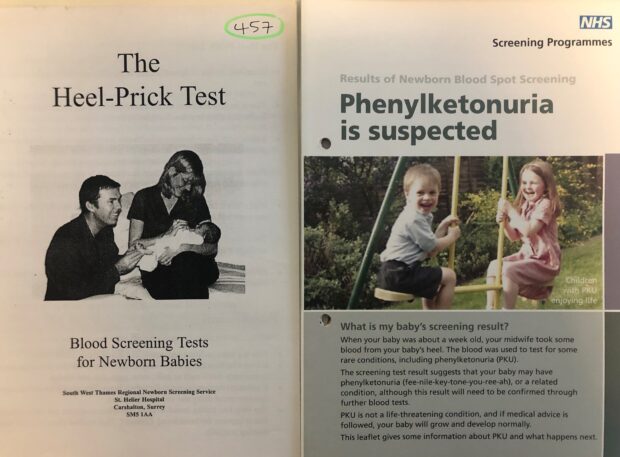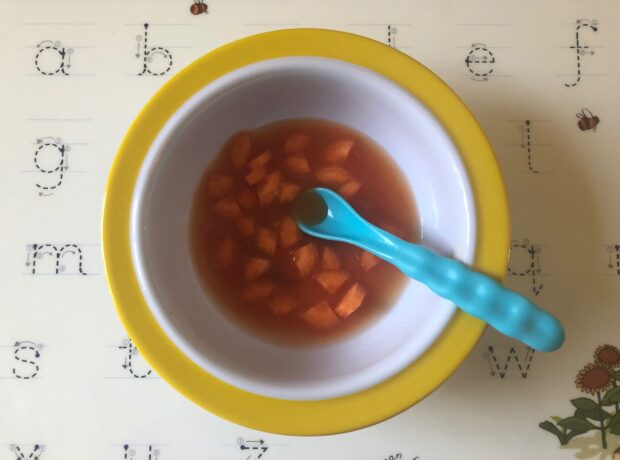
In October 1999 my precious new baby, Hannah, was screened at 5 days old for phenylketonuria (PKU) and one other condition.
The midwife came to our home to collect the 4 spots of blood from her heel and said to me about the test … “it’s only routine and it won’t affect you.”
Those words have never left me.
Newborn blood spot screening is a routine screening test, offered by the NHS for the past 50 years, and it certainly does affect families. Approximately 70 babies a year are born with PKU in the UK and the only treatment available is a very strict low protein diet with an amino acid substitute.
One of those babies born in 1999 with PKU in the UK was mine, and this is my story.
The PKU diet
Babies born with PKU lack an enzyme which means they are unable to break down an amino acid, phenylalanine.
Phenylalanine is found in almost all food groups so almost all foods containing protein are removed from the diet and replaced with:
- low protein foods (limited in choice and only available on prescription)
- fruit and vegetables that have been analysed for their phenylalanine content
- a phenylalanine-free amino acid substitute which replaces the natural protein removed from the diet
It's hard to explain how difficult the diet is on a day to day basis and it can be mentally and physically draining to manage.
I used to try and be as inventive as possible with Hannah's food, including replacing baked beans with bits of carrot (see below), or swapping egg yolks for apricots to look like 'normal' fried eggs.

Life before screening
Before newborn screening for PKU, babies like Hannah would be born healthy but gradually over the weeks and months deteriorate as the phenylalanine built up in their brain. This led to irreversible brain damage.
We are incredibly fortunate that Hannah was born during the years that newborn screening for PKU has been available.
50 years ago, before the introduction of blood spot screening, babies were tested at around 6 weeks of age using urine from the nappy. And before the nappy test, babies born with PKU were not diagnosed until they started to show developmental delays and other devastating symptoms of brain damage. Life was extremely difficult for these children and their parents and families.
The impact of screening for PKU
Newborn screening is a routine test and PKU is very rare, but it did affect my daughter and my family. However, newborn screening has allowed Hannah a life she would never have been able to have before screening, diagnosis and early treatment.
While we are so thankful for this, our thoughts are never far away from the devastating impact of PKU, before screening was available, and the people and families it affected.
At the top of this blog post is a picture of one of the early information leaflets for PKU, to show how things have changed compared to the colourful literature you receive today.
Here's a quote from an early newborn screening handbook for professionals and I think it's a great way to round off my story.
The historical success of the blood spot screening programme has depended on the diligence and dedication of many health professionals, particularly laboratory directors and midwives.
This blog post is my own small tribute to all the professionals who helped create such an important screening programme which has had such a massive impact for so many families.
Marking 50 years
It's now 50 years since the introduction of UK-wide dried blood spot screening for phenylketonuria (PKU) in newborn babies. To celebrate the landmark, we have published a series of articles looking at how blood spot screening for PKU came about and how it paved the way for the expanded programme we recognise today.
PHE Screening blog
The PHE Screening blog provides up to date news from all NHS screening programmes. You can register to receive updates direct to your inbox, so there’s no need to keep checking for new blogs. If you have any questions about this blog article, or about population screening in England, please contact the PHE screening helpdesk.
2 comments
Comment by Gill posted on
Thank goodness for screening. My grandson has PKU and it’s true to say that managing a controlled diet has a daily impact on family life. But without screening and diet the consequences would be devastating.
I’m aware of this, having known of people born with the condition historically and having seen how their lives have been affected.
Comment by Robyn posted on
good to hear from a parent of the problems of living with this disease. Thank you